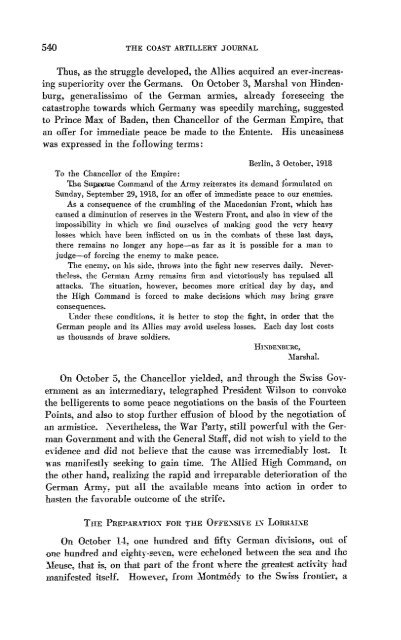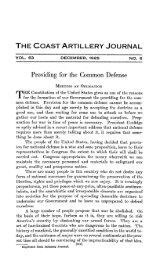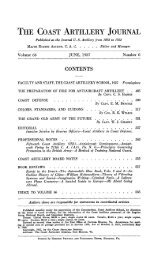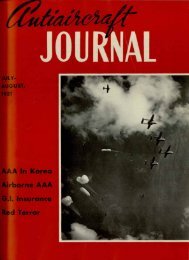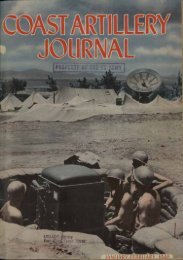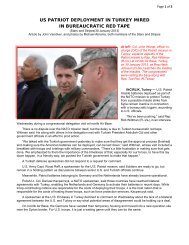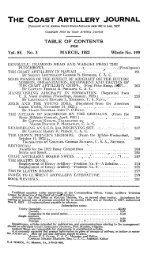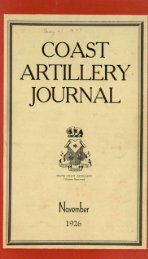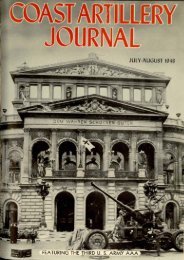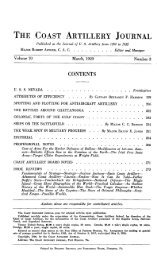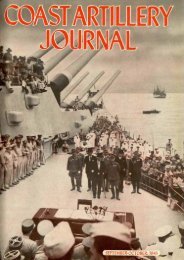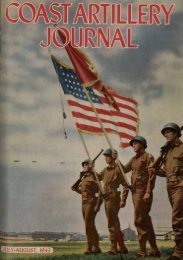COAST ARTILLERY, JOURNAL - Air Defense Artillery
COAST ARTILLERY, JOURNAL - Air Defense Artillery
COAST ARTILLERY, JOURNAL - Air Defense Artillery
You also want an ePaper? Increase the reach of your titles
YUMPU automatically turns print PDFs into web optimized ePapers that Google loves.
540 THE <strong>COAST</strong> <strong>ARTILLERY</strong> <strong>JOURNAL</strong><br />
Thus, as the struggle developed, the Allies acquired an ever-increasing<br />
superiority over the Germans. On October 3, Marshal von Hindenburg,<br />
generalissimo of the German armies, already foreseeing the<br />
catastrophe towards which Germany was speedily marching, suggested<br />
to Prince Max of Baden, then Chancellor of the German Empire, that<br />
an offer for immediate peace be made to the Entente. His uneasiness<br />
was expressed in the following terms:<br />
Berlin, 3 October, 1918<br />
To the ChanceIIor of the Empire:<br />
The SUpl:1imLe Command of the Army reiterates its demand f~rmulated on<br />
Sunday, September 29, 1918, for an offer of immediate peace to our enemies.<br />
As a consequence of the crumbling of the Macedonian Front, which has<br />
caused a diminution of reserves in the Western Front, and also in view of the<br />
impossibility in which we find ourselves of making good the very heavy<br />
losses which have been inflicted on us in the combats of these last days,<br />
there remains no longer any hope-as far as it is possible for a man to<br />
judge--of forcing the enemy to make peace.<br />
The enemy, on his side, throws into the fight new reserves daily. Nevertheless,<br />
the German Army remains firm and victoriously has repulsed all<br />
attacks. The situation, however, becomes more critical day by day, and<br />
the High Command is forced to make decisions which may bring grave<br />
consequences.<br />
"Cnder these conditions, it is better to stop the fight, in order that the<br />
German people and its Allies may avoid useless losses. Each day lost costs<br />
us thousands of brave soldiers.<br />
HIO'iDE:SRCRC,<br />
::\Iarshal.<br />
On October 5, the Chancellor yielded, and through the Swiss Government<br />
as an intermediary, telegraphed President Wilson to convoke<br />
the belligerents to some peace negotiations on the basis of the Fourteen<br />
Points, and also to stop further effusion of blood by the negotiation of<br />
an armistice. i\evertheless, the War Party, still powerful with the German<br />
Government and with the General Staff, did not wish to yield to the<br />
evidence and did not believe that the cause was irremediably lost. It<br />
was manifestly seeking to gain time. The Allied High Command, on<br />
the other hand, realizing the rapid and irreparable deterioration of the<br />
German Army, put all the available means into action in order to<br />
hasten the favorable outcome of the strife.<br />
THE PREPAK\TIO:';" FOR THE OFFE:.\"sn-E I:';" LORIU.I:\E<br />
On October 14, one hundred and fifty German divisions, out of<br />
one hundred and eighty-seven, were echeloned between the sea and the<br />
)'Ieuse, that is, on that part of the front where the greatest activity had<br />
manifested itself. However, from ~Iontmedy to the Swiss frontier, a


